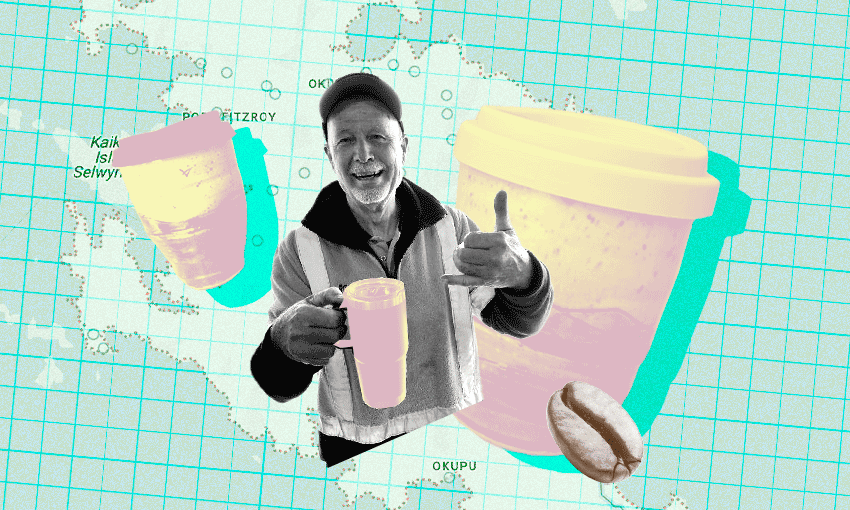New Zealanders send more than 295 million single-use cups to landfill each year. Here’s how one small community stamped out the habit – and got visitors on board too.
That even Ingrid Hipkiss’s household didn’t get it was a massive red flag. There had apparently been a years-old debate at the Morning Report host’s place as to whether the things were recyclable.
Signals coming from recycling and compost bins across the motu were no better – the question clearly confounds other sharp people too. The conclusion? Inescapable. New Zealanders simply don’t get the threat of the single use takeaway cup (SUC).
Made to look either recyclable or compostable, this ubiquitous everyday item is effectively neither. The plastic lining used to make them watertight rules them out on both counts.
As Auckland Council’s general manager of waste solutions Parul Sood told Hipkiss when describing what can and can’t go in your recycling bin: “No coffee cups, EVER.”
Some SUCs claim to be compostable, but unless you have an industrial-grade composting system handy, they ain’t going to break down. There’s only one forever home for the SUC, and that’s the landfill, where they take between 20-30 years to decompose.
When you factor in that New Zealanders use over 295 million single-use cups every year, you begin to see what a colossal one-fingered salute to Papatūānuku this all is.
So what to do about this wolf in sheep’s clothing; this stealthy villain of the hot drink world? In mid-2023 a team of waste-busters on Aotea/Great Barrier decided something had to give and launched a plan to phase out SUCs altogether.
By October 1, if you wanted a takeaway hot drink on Aotea, you had three options: 1) Take your own keep cup 2) Use a mug from participating cafes’ mug libraries or 3) Purchase a $10 stainless-steel cup from an island-wide “borrow” scheme (which can then be returned to any outlet for a refund).
An island-wide “mug drive” saw hundreds of disused household mugs amassed for the cause.
“We’re lucky on Aotea because we’re small, so something like this is totally doable,” says Jo O’Reilly, director of the island’s resource recovery centre and driver of the scheme. “I’ve been so impressed by how enthusiastic the community is, from our retailers to our coffee drinkers.”
“It’s been a really easy transition for us,” says Pah Beach café’s Rochelle Winger. “What I love most about it is that if people forget their cups, they decide to sit in for their coffee, which brings back that precious cafe culture of catching up, slowing down and having good chats.”
Previously, Winger had experienced a crushing sense of guilt as she drove around the island and saw takeaway cups from her cafe discarded on the side of the road. “We owe it to our island to look after her. As caretakers, it’s our responsibility.”
Locals got right behind it. From tradies to farmers to toddlers to grandmas, islanders appeared to move seamlessly to a SUC-free world.
“It took a little bit to get used to it but we’re away now,” says longtime local Michelle Hartley-Scott. “I just keep a reusable cup in my car – use, wash, return and repeat.”
“It’s one of the things that makes Aotea great,” according to Aotea/Great Barrier Local Board member Chris Ollivier.
The challenge, however, was always going to be the thousands of tourists and visitors who flock to Aotea over summer – how would they react to the SUC rug being pulled out from under them? Café owners braced for a backlash, but it never eventuated.
“Everyone has been absolutely amazing and totally understanding about it,” says Adrienne Bowler from Baked on Barrier. “It’s been a massive eye opener to so many people.”
“What most visitors to the island probably don’t realise is that every bit of landfill waste must get shipped back to the mainland at huge cost, because we no longer have a landfill here. We’re doing all we can to reduce those volumes,” says Jo O’Reilly.
Wānaka is also striving to be SUC-free, with 10 local cafes now onboard.
“We predict that since 2018, when we went SUC-free, we’ve saved 8,000 coffee cups each year from going to landfill,” says Liam from Cardrona Alpine Resort.
“We decided to do it because there was too much wastage,” says Sara from Fedeli. “We reckon we save about 100 cups a day. We want to change the way we think about plastic, and the way we think about waste altogether.”
O’Reilly says since the Aotea project kicked off, organisations from around the country have been in touch to learn more about how they can follow suit. “There’s a real desire for this in many communities. We’ve had meetings and shared information with people from Waiheke, Whitianga and Hamilton.”
As the island’s Steve Billingham puts it: “Could it be that single use cups are has-beans?”

